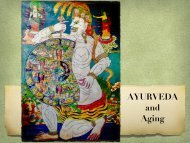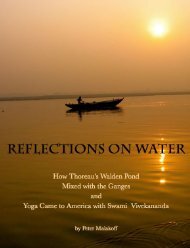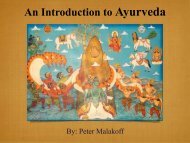How Thoreau's Walden Pond Mixed with the Ganges and Yoga Came to America with Swami Vivekananda
One early morning in 1846, during the coldest days of a New England winter, Henry David Thoreau looked out the window of his small cabin on Walden Pond and saw men cutting its ice into blocks. That ice was hauled by horse to a railroad that ran across the western edge of Walden Pond, packed into a boxcar, taken to Boston and loaded onto a clipper ship that sailed to Calcutta, India, arriving about four months later. Once there, that ice was purchased by grateful members of the East India Company. Thoreau had witnessed a small part of the global ice trade between New England and India that took place during the latter part of the nineteenth century. When Thoreau considered the ice trade, his vision sailed on metaphors far beyond the scope of business. The waters he imagined flowed both east and west and carried not just natural elements, but culture, religion and philosophy as well. He envisioned that after arriving in Calcutta, the New England ice of Walden Pond would eventually melt and run downhill where it would join with the sacred water of the Ganges. He wrote in Walden: "It appears that the sweltering inhabitants of Charleston and New Orleans, of Madras and Bombay and , drink at my well. In the morning I bathe my intellect in the stupendous and cosmogonal philosophy of the , since whose composition years of the gods have elapsed, and in comparison with which our modern world and its literature seem puny and trivial; and I doubt if that philosophy is not to be referred to a previous state of existence, so remote is its sublimity from our conceptions. I lay down the book [Bhagavad-Gita] and go to my well for water, and lo! there I meet the servant of the Bramin, priest of and and who still sits in his temple on the Ganges reading the , or dwells at the root of a tree with his crust and water jug. I meet his servant come to draw water for his master, and our buckets as it were grate together in the same well. The pure Walden water is mingled with the sacred water of the Ganges." This book tells the story of these waters . . .
One early morning in 1846, during the coldest days of a New England winter, Henry David Thoreau looked out the window of his small cabin on Walden Pond and saw men cutting its ice into blocks. That ice was hauled by horse to a railroad that ran across the western edge of Walden Pond, packed into a boxcar, taken to Boston and loaded onto a clipper ship that sailed to Calcutta, India, arriving about four months later. Once there, that ice was purchased by grateful members of the East India Company. Thoreau had witnessed a small part of the global ice trade between New England and India that took place during the latter part of the nineteenth century.
When Thoreau considered the ice trade, his vision sailed on metaphors far beyond the scope of business. The waters he imagined flowed both east and west and carried not just natural elements, but culture, religion and philosophy as well. He envisioned that after arriving in Calcutta, the New England ice of Walden Pond would eventually melt and run downhill where it would join with the sacred water of the Ganges. He wrote in Walden: "It appears that the sweltering inhabitants of Charleston and New Orleans, of Madras and Bombay and , drink at my well. In the morning I bathe my intellect in the stupendous and cosmogonal philosophy of the , since whose composition years of the gods have elapsed, and in comparison with which our modern world and its literature seem puny and trivial; and I doubt if that philosophy is not to be referred to a previous state of existence, so remote is its sublimity from our conceptions.
I lay down the book [Bhagavad-Gita] and go to my well for water, and lo! there I meet the servant of the Bramin, priest of and and who still sits in his temple on the Ganges reading the , or dwells at the root of a tree with his crust and water jug. I meet his servant come to draw water for his master, and our buckets as it were grate together in the same well. The pure Walden water is mingled with the sacred water of the Ganges."
This book tells the story of these waters . . .
Create successful ePaper yourself
Turn your PDF publications into a flip-book with our unique Google optimized e-Paper software.
culture, literature, philosophy <strong>and</strong> religion, he was most of all a Realizer, born<br />
<strong>to</strong> teach in an increasingly westernizing world.<br />
One day, during a casual discussion, one of Vivekan<strong>and</strong>a's admirers <strong>and</strong><br />
friends, <strong>the</strong> Dewan of Porb<strong>and</strong>ar, said, "<strong>Swami</strong>ji, I am afraid you cannot do<br />
much in this country. Few will appreciate you here. You ought <strong>to</strong> go <strong>to</strong> <strong>the</strong><br />
West where people will underst<strong>and</strong> you <strong>and</strong> your worth. Surely you can throw<br />
a great light upon western culture by preaching <strong>the</strong> Sanatana Dharma. The<br />
poverty ridden illiterate people of our country are not yet ready <strong>to</strong> receive <strong>the</strong><br />
message of Vedanta. Why don't you attend <strong>the</strong> Parliament of Religions <strong>to</strong> be<br />
held in Chicago a few months hence? There you will represent <strong>and</strong> elaborate<br />
<strong>the</strong> true Hinduism of which your Guru, Sri Ramakrishna, was <strong>the</strong> living<br />
embodiment."<br />
Vivekan<strong>and</strong>a would never ab<strong>and</strong>on <strong>the</strong> social upliftment of <strong>the</strong> masses of<br />
India. <strong>How</strong>ever, he thought that much good might come of commerce <strong>with</strong><br />
<strong>the</strong> ideas <strong>and</strong> technology of <strong>the</strong> West. If he could bring <strong>the</strong> religious wisdom<br />
of India <strong>to</strong> <strong>America</strong>, perhaps <strong>the</strong> West could help <strong>with</strong> its genius of scientific<br />
knowledge, modern agriculture <strong>and</strong> industry <strong>to</strong> help lift India out of its<br />
oppressive poverty.<br />
53


















